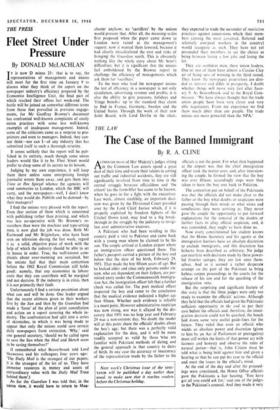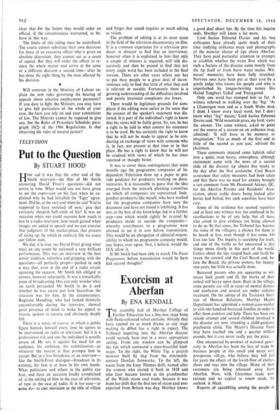The Case of the Banned Immigrant
THE LAW By R. A. CLINE A uniouGn most of Her Majesty's judges sitting
A
the Common Law courts spend a great deal of their time and waste their talents in sorting out traffic and industrial accidents, they are still significantly involved from time to time in the eternal struggle between officialdom and 'the citizen' (as the form-filler has come to be known, when he goes in for a fight with the executive). Last week, almost stealthily, an important deci- sion was given by the Divisional Court presided over by the Lord Chief Justice which, if it is properly exploited by freedom fighters of the Crichel Down kind, may lead to a big break- through in the struggle by the judiciary to invigi- late over administrative excesses.
A Pakistani who had been residing in this country paid a visit to Pakistan and came back with a young man whom he claimed to be his son. The couple arrived at London airport where an immigration officer questioned them. The father's passport carried a picture of the boy and below that the date of his birth, February 29, 1951. That made the boy fifteen years of age. But he looked older and since only persons under six- teen, who are dependent on their fathers, are per- mitted entry under the Commonwealth Immigra- tion Act, the immigration officer felt that a further check was called for. The port medical officer inspected the boy and came to the conclusion that the medical evidence indicated a higher age than fifteen. Whether such evidence is reliable is a moot point. However administrative suspicion was now rising, nor was it allayed by the dis- covery that 1951 was no leap year and February 29 was a non-existent day. No doubt the reader will at this point share the officials' doubts about the boy's age; but there was a perfectly valid explanation for the date, and it will be more readily accepted as valid by those 'Who are familiar with Pakistani methods of dating and the general approach in that country to dates of birth. In any case the accuracy or inaccuracy of the representation made by the father to the
Next week's Christmas issue of the SPEC- veroR will be published a day earlier than usual, to make sure that it reaches readers before the Christmas holiday.
officials is not the point. For what then happened at the airport was that the chief immigration officer took the matter over, and, after interview- ing the couple, he formed the view that the boy was over fifteen; accordingly steps were then taken to have the boy sent back to Pakistan.
The contention put on behalf of the Pakistanis was that the officials did not make clear to the father or the boy what doubts or suspicions were passing through their minds or what views and conclusions they were arriving at. They never gave the couple the opportunity to put forward explanations for the removal of the doubts or further facts to allay official suspicion, and, it was contended, they ought to have done so.
Now every constitutional law student knows that the Home Secretary and his agents at the immigration barriers have an absolute discretion to exclude immigrants, and this discretion has hitherto been described as arbitrary. No judge can interfere with decisions made by these power- ful frontier satraps; they are law unto them. selves. And so it seemed a rather desperate attempt on the part of the Pakistani to bring habeas corpus proceedings in the courts for the release of his son and for the quashing of the immigration veto.
But the surprising and significant feature of this story is that the three judges were only too ready to examine the officials' actions. Although they held that the officials had given the Pakistanis sufficient opportunity in the end to put their case before the officials and, therefore, the immi- gration decision could not be quashed, the bench laid down some very useful guide-lines for the future. They ruled that even an official who wields an absolute power and discretion (given to him by an Act of Parliament or prerogative) must still within the limits of that power act with fairness and honesty and observe the rules of natural justice—that is, John Citizen must be told what is being held against him and given a hearing so that he can put his case to the official and meet the issues in the official's mind.
At the end of the day and after the proceed- ings were constituted, the Home Office officials gave the Pakistanis a fair hearing. 'You have got all you could ask for,' said one of the judges to thel'akistani's counsel. And they made it very clear that for the future they would order an official, if the circumstances warranted, to be- have in this way.
The limits of this ruling must be underlined. The courts cannot substitute their own decisions for those of an executive officer who is given an absolute discretion; they cannot act as a court of appeal. But they will order the officer to re- open the whole matter and arrive at the same or a different decision a second time—after he has done the right thing by the man affected by his decision.
Will someone in the Ministry of Labour ex- plain the new rules governing the hearing of appeals about selective employment payments? If you dare to fight the Minister, you may have to give full particulars of the whole of your case, the facts you rely on and your contentions of law. The Minister cannot be required to give any. See the Rules of Procedure Schedule, para- graph 10(2) of the 1966 Regulations. Is that observing the rules of natural justice?































 Previous page
Previous page